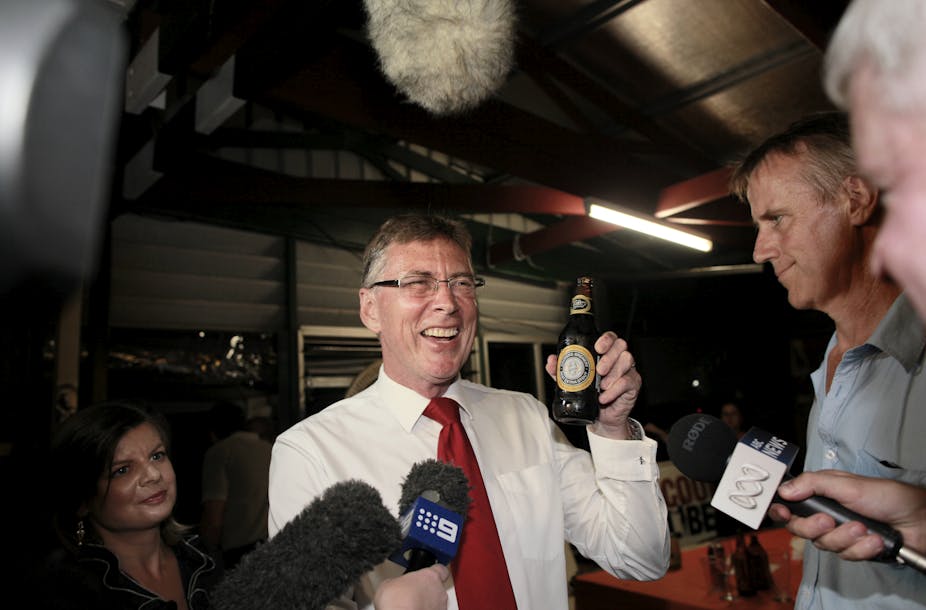Labor has just lost another election in Australia to the opposition in an electoral race that was dominated by negative messages, where both parties attempted unsuccessfully to differentiate themselves from their federal counterparts. This is just the most recent illustration of the limits of modern parliamentary democracy in Australia.
Such issues dominate the media and will have a significant impact in the election of an unpopular leader next year as Australian Prime Minister, be they Labor or Liberal. Both are currently unable to improve on their low approval ratings, with neither able to inspire populist hope, or engage in a substantial policy debate.
This kind of anti-politics is turning voters away from the democratic process and politics in general.
Being able to vote for a “lesser of two evils” rather than for a positive vision of society and politics is proving unsustainable for voters, as the situation in Queensland is proving. After delivering the LNP a landslide victory, voters are now dismayed with the LNP for implementing its austerity measures. Resistance in the form of petitions, demonstrations and public outrage are now emerging in response.
Australian political parties are not alone in the never-ending race to the lowest common denominator in order to attract the socially conservative and economically neo-liberal centre-right vote. What became natural for the right since the Thatcher and Reagan years, eventually pervaded all mainstream parties. But ever since Tony Blair led UK Labour to a landslide victory in 1997 by capturing the centrist vote through the systematic dismantling of the Labour platform and ideology, left-wing parties across the world have emulated this approach. While they did so with some degree of success, the political cost was enormous.
In our current polity, our democratic options are limited to parties whose differences are mostly in name and whose visions of society differ only in minute details.
The choice between Labo(u)r and conservative/liberal parties, whose leaders agree on most key economic and social issues has left many disillusioned with the political system. Symbolic for this disillusionment is the rise of abstention, as well as fringe parties establishing themselves as “alternatives”.
To date, the most prominent alternatives have relied on various platforms such as environmental and ecological concerns, civil liberties and ultra-nationalism.
The Greens, for instance, have for a long time held considerable power and even shared government with left-wing parties in places such as Germany (1998-2005), France (1997-2002 and again since May 2012) and elsewhere in Europe as well as Australia (since 2010). More recently civil liberties debates, especially around internet use and intellectual property, have given rise to the Pirate party in Europe that has begun to take seats in the European Parliament in Sweden and regional parliaments in Germany as well as on a local government level. Since the 1980s, the extreme right has gone through various waves of success, and its racist ethno-exclusivist programmes have swayed up to a third of voters in some European countries.
While the compulsory preferential system has limited the scope for extreme parties to gain national prominence in Australia, the success of the One Nation Party in the 1990s and the Greens more recently could be considered as the wish of parts of the electorate to leave the current political consensus, and return to ideological disagreement and debate – in short to return to a more active type of politics.
Both parties could also be seen as the product of the failure of successive Australian governments to gain support for their consensual economic reforms. As opposed to the growing distrust our governing politicians generate, these alternative parties are trusted to offer a more adapted, albeit possibly flawed and dangerous, solution to society’s ills. Yet so far, it seems that the current political consensus, despite its lack of popularity, has managed to quash resistance and alternatives. This was done by outflanking the extreme right on its own territory and by bringing into line the rogue left-wing alternatives with promises of coalitions and portfolios.
But the failure is not just systemic. The rise of the individual and the concomitant decline of social responsibility have led to voters focusing on transactional politics at the expense of transformational politics.
Grand social, political and economic transformations have become “too hard” to push through parliament and “too difficult” to sell to voters as they lack the immediacy currently ruling our lives.
Instead, the mainstream voter is offered quick individual perks. This individualised voting behaviour coupled with the aforementioned protest votes makes politics into a policy circus, where band aid measures are routinely applied to cover up the dearth of vision and political will.

